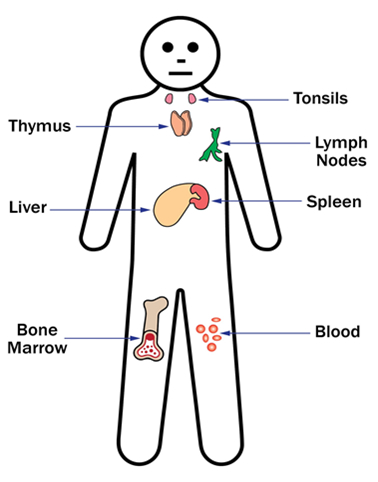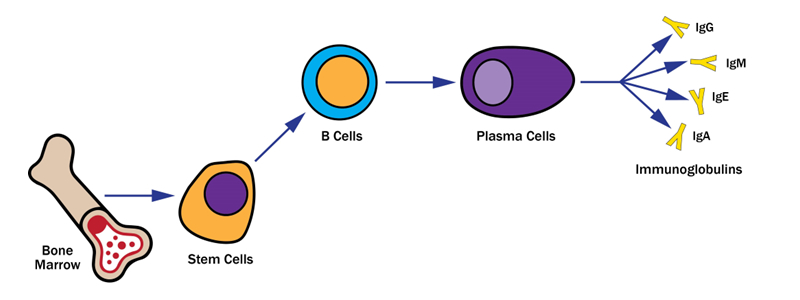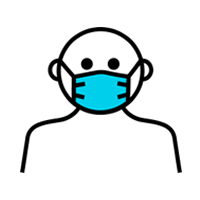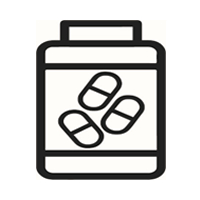Primary Immunodeficiencies and the Immune System
Frequently Asked Questions
This document has been developed by ASCIA, the peak professional body of clinical immunology/allergy specialists in Australia and New Zealand. ASCIA information is based on published literature and expert review, is not influenced by commercial organisations and is not intended to replace medical advice.
For patient or carer support contact AusPIPS, HAE Australasia, IDFA, or IDFNZ.
![]() ASCIA PC PID-IEI IMMUNE SYSTEM FAQ 2025274.09 KB
ASCIA PC PID-IEI IMMUNE SYSTEM FAQ 2025274.09 KB
Q 1: What are primary immunodeficiencies?
Inborn errors of immunity (IEI) include primary immunodeficiencies (PID) and are a group of more than 550 potentially serious chronic medical conditions.
They are caused by defects in genes that control the immune system and can lead to frequent or severe infections, and other chronic immune system disorders, including autoimmune problems.
Q 2: What is the role of the immune system?
The body’s immune system involves a complex network of organs, cells and proteins that are located throughout the body. The immune system protects the body’s own cells, while defending against:
-
Infections from bacteria, viruses, fungi, parasites, and other microbes.
-
Other invaders, such as cancer cells.
Immunoglobulins, also known as antibodies, are one of the major proteins of the immune system. People with immunoglobulin (antibody) deficiencies:
-
Have inherited or acquired defects that affect development and/or function of the immune system.
-
Have increased susceptibility to infections, and in some cases, autoimmunity and malignancy.
-
Usually require immunoglobulin replacement therapy (IRT) to improve their health related quality of life.
Q 3: What are the main organs of the immune system?
 The main organs of the immune system include the:
The main organs of the immune system include the:
-
Bone marrow - the location where all cells of the immune system begin their development from primitive stem cells.
-
Thymus - an organ located in the upper chest. Immature lymphocytes leave the bone marrow and mature in the thymus to become mature T lymphocytes (T cells).
-
Lymphatic vessels and organs (thymus, lymph nodes, tonsils, spleen) - important for the optimal functioning of general and specific immune responses.
-
Liver - contains large numbers of phagocytic cells which ingest bacteria in the blood as it passes through the liver.
-
Blood - the circulatory system that carries cells and proteins of the immune system from one part of the body to another.
Q 4: What are leukocytes (white blood cells)?
One of the most important functions of the immune system is to make leukocytes (white blood cells):
-
T lymphocytes (T cells) comprise around half the leukocytes in healthy people and are one of the most important cells in the immune system. T cells recognise the body’s own cells, identify germs and invaders, including cancer, and coordinate the rest of the immune system. The thymus is required for the development of T cells (thymus derived cells).
-
B lymphocytes (B cells) are generated by haematopoietic stem cells in the bone marrow (bone marrow derived cells) and helped by T cells to produce immunoglobulins (antibodies).
-
Phagocytes (including neutrophils and macrophages) are generated by haematopoietic stem cells in the bone marrow, and they ingest and destroy antibody coated foreign invaders.
Q 5: What are T lymphocytes (T cells)?
T lymphocytes (T cells) originate from the thymus:
-
Helper T cells ‘help’ other T cells and B cells to perform their functions.
-
Cytotoxic T cells mature in the thymus and are responsible for killing infected cells.
-
Regulatory T cells suppress immune response, thereby maintaining homeostasis and self-tolerance.

Q 6: What are B lymphocytes (B cells) and immunoglobulins (antibodies)?
Immunoglobulin production depends on haematopoietic stem cells in the bone marrow, B cells and plasma cells. Immunoglobulins:
-
Are highly specialised protein molecules, that fit foreign antigens like a lock and key.
-
Can be produced to match all possible microorganisms in our environment.

Q 7: What are immunoglobulin (antibody) classes?
The main classes of immunoglobulins are IgG, IgM, IgE and IgA:
-
IgG is the major immunoglobulin in the body and is found in the blood stream as well as in tissues and secretions. Immunoglobulin replacement therapy (IRT) contains 97-98% IgG specific antibodies against a broad spectrum of bacterial and viral pathogens, with traces of IgM and IgA.
-
IgM is formed very early in response to an infection.
-
IgE is raised in response to parasite infections and allergens.
-
IgA is secreted into mucus, intestines and tears, where it protects those areas from infection.
Q 8: What are antibody (immunoglobin) deficiencies?
Antibody deficiencies can occur in people who have primary immunodeficiencies (PID) who:
-
Have inherited defects that affect development and/or function of the immune system, which result in increased susceptibility to infections, autoimmunity, and malignancy.
-
Are unable to make enough of their own antibodies, or their antibodies don’t work properly, so replacing these antibodies with immunoglobulin replacement therapy (IRT) helps to improve their health related quality of life.
Antibody deficiencies can also be due to other medical conditions, including secondary immunodeficiencies, which can result from transplantation or some forms of treatment. Secondary immunodeficiencies may be lifelong or may ease once treatment is ceased.
Q 9: What other measures can reduce risk of infections?
To maintain general health, it is important to get enough sleep, eat healthy foods, manage stress and exercise regularly. The following measures can also assist to reduce the risk of infections:
 |
Vaccination reduces the risk of developing infections and reduces spread of disease. |
 |
It is important to wash hands regularly with soap to reduce the spread of infections. |
 |
People who are unwell should stay home and follow health regulations. |
 |
Some patients with antibody deficiencies may require antibiotic prophylaxis. |
© ASCIA 2025
Content updated May 2025
For more information go to www.allergy.org.au/patients/immunodeficiencies
To support allergy and immunology research go to www.allergyimmunology.org.au/donate
